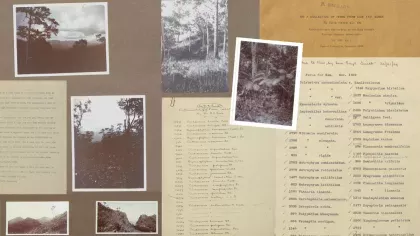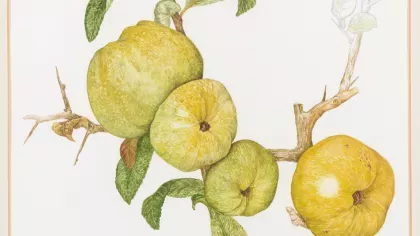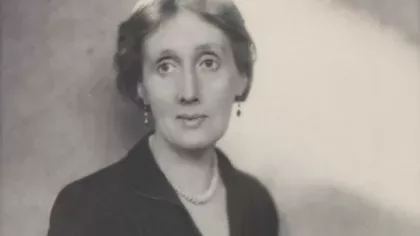18 August 2017
'My dear Bentham' - a Harvard Summer School visit to Kew
On the 26th June 2017, The Joseph Hooker Correspondence Project welcomed a group of undergraduates from Harvard University to Kew as part of their ‘Darwin & Evolutionary Biology Summer School’. Victoria Tong, one of the visiting students here explores some of the activities the group undertook during their two weeks at Kew.

Harvard Summer School Visit 2017
For the past month, a group of undergraduates from Harvard have been following a summer school program in England, studying the history of evolution and evolutionary biology itself at Queens College, Oxford. Most of us decided to do the program based on some combination of loving or wanting to learn more about science, learning from one of our most esteemed and entertaining professors, and also being able to study at such a prestigious institution in Europe.
As an optional add-on to the program, we were able to help out at Kew's Library, Art & Archives for two weeks prior to going to Oxford in what our professor described as “a fantastic hands-on introduction to the world of botany, evolutionary biology and history of science in one of the best botanical research facilities in the world”. He wasn’t wrong. And none of us could resist an offer like that, so off we went to London to do whatever was on the table.
London, 19th century handwriting and Joseph Dalton Hooker
Whilst at Kew, our official occupation was transcribing letters from Joseph Dalton Hooker to the botanist George Bentham (1800-1884) to the best of our meagre undergraduate abilities as part of the Joseph Hooker Correspondence Project. These letters chart the over 30 year friendship and working relationship between Hooker and Bentham that resulted in the publication of numerous botanical treatises including Genera plantarum (1862-1883).
Needless to say, Hooker’s enigmatic handwriting, botanical terminology and period-drama-worthy vernacular (he sometimes made hilarious analogies that had us reeling for days!) presented quite the challenge and despite each of us being presented on the first day with a handy guide detailing the quirks of Hooker’s handwriting, the vast majority of us still plodded along with relative difficulty. It was, however, an insightful experience that afforded us a more well-rounded view of the stereotypically austere Victorian botanist through letters regarding not only his work and collaborations but also his family and personal life. His choice remarks and somewhat “savage” comments regarding certain members of his extended family in particular were met with considerable hilarity on our part.
Exploring Kew and the history of botanical science
The highlight of our two weeks, however, was perhaps the opportunity to spend time to just explore – Hooker, through his correspondence; botany, at an amazing research facility; and the plants themselves through artworks and also in the incredible gardens. We also helped out at the Joseph Dalton Hooker Bicentenary Meeting which was quite a change of scenery, particularly with the slightly adrenaline-inducing conference registration in the morning.
Nevertheless, we (and by “we” I mean two of us) managed to put our millennial skills to good use by live-tweeting the event to much success. Visiting Kew's Shirley Sherwood Gallery and the Marianne North Gallery, spectacular though they were, once again proved that art galleries are truly divisive places – most people filter through in a fashion not unlike water flowing through a sieve, and then proceed to camp out on any available seating while waiting for their friends who take three times as long to make their way through only to come back on the weekend to go through it all again. Our tour of the herbarium and archives put filing and digitising course material at the end of semester into sharp relief. And despite the comparatively warm and humid weather we visited them in, the tropical nursery and other parts of the garden were all absolutely stunning.
Before we knew it the two weeks were up and whilst a slow process the group had transcribed over 150 pages of handwritten text representing over 40 individual letters. Everyone had an amazing time at Kew and despite the eagerness to head off to Oxford and join our fellow compatriots, I know Kew will be missed very much (so much so that some of us actually decided to continue volunteering for the “Jos D Hooker” project)!
- Victoria Tong -
B.A. Candidate in Neurobiology, Secondary in Music
Harvard College
Harvard University


